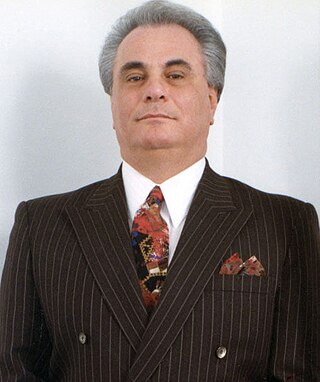
John Gotti was an American mafioso and boss of the Gambino crime family in New York City. He ordered and helped to orchestrate the murder of Gambino boss Paul Castellano in December 1985 and took over the family shortly thereafter, leading what was described as America's most powerful crime syndicate.

Salvatore "Sammy the Bull" Gravano is an American former mobster who rose to the position of underboss in the Gambino crime family. As the underboss, Gravano played a major role in prosecuting John Gotti, the crime family's boss, by agreeing to testify as a government witness against him and other mobsters in a deal in which he confessed to involvement in 19 murders.

The Gambino crime family is an Italian-American Mafia crime family and one of the "Five Families" that dominate organized crime activities in New York City, within the nationwide criminal phenomenon known as the American Mafia. The group, which went through five bosses between 1910 and 1957, is named after Carlo Gambino, boss of the family at the time of the McClellan hearings in 1963, when the structure of organized crime first gained public attention. The group's operations extend from New York and the eastern seaboard to California. Its illicit activities include labor and construction racketeering, gambling, loansharking, extortion, money laundering, prostitution, fraud, hijacking, and fencing.

The Genovese crime family, also sometimes referred to as the Westside, is an Italian-American Mafia crime family and one of the "Five Families" that dominate organized crime activities in New York City and New Jersey as part of the American Mafia. The Genovese family has generally maintained a varying degree of influence over many of the smaller mob families outside New York, including ties with the Philadelphia, Cleveland, Patriarca, and Buffalo crime families.
Carmine "The Bull" Agnello is a New York mobster of the Gambino crime family who ran a scrap metal recycling operation.
The Colombo crime family is an Italian-American Mafia crime family and the youngest of the "Five Families" that dominate organized crime activities in New York City within the criminal organization known as the American Mafia. It was during Lucky Luciano's organization of the American Mafia after the Castellammarese War, following the assassinations of "Joe the Boss" Masseria and Salvatore Maranzano, that the gang run by Joseph Profaci became recognized as the Profaci crime family.
Richard Martino is a member of the New York Gambino crime family who was involved in Internet and phone scams that cost consumers $750 million. Martino introduced the Cosa Nostra into this area of crime.

Frank "Frankie Loc" LoCascio was an American mobster who rose to become consigliere of the Gambino crime family under the administration of John Gotti.
Thomas Francis Gambino was an Italian-American New York City mobster and a longtime caporegime of the Gambino crime family who successfully controlled lucrative trucking rackets in the New York City Garment District. He was the son of Carlo Gambino nephew of Paul Castellano and son-in-law of Tommy Lucchese.
The Ozone Park Boys, also known as "Liberty Posse" and "The Young Guns", are a Gambino crime family Mafia crew based in Ozone Park, Queens. They are infamous for their massive number of crimes, including an illegal $30 million-a-year sports gambling enterprise.
Joseph "Jo Jo" Corozzo, Sr. was an American mobster who was the reputed consigliere of the Gambino crime family of New York.
Louis Vallario, also known as "Big Louie" and "Big Lou", is a member of the Gambino crime family who was a top aide to boss John Gotti and Salvatore "Sammy the Bull" Gravano in the late 1980s.
George "Big Georgie" DeCicco was a New York mobster and longtime captain in the Gambino crime family. DeCicco is one of the last captains of the old John Gotti administration in the 1980s who have not been under any indictment until now. DeCicco is the brother of former Gambino underboss Frank DeCicco, who was killed in a car-bomb meant for his boss John Gotti, ordered by then boss of the Genovese crime family who is now deceased, Vincent "Chin" Gigante, and Lucchese crime family leaders Vittorio "Vic" Amuso and Anthony "Gaspipe" Casso as revenge for the murder of former Gambino crime family boss, Paul Castellano, a strong ally of both the Genovese and Lucchese crime families.
Gaetano "Corky" Vastola is a New Jersey mobster who became a captain in the DeCavalcante crime family in New Jersey.
ILD Teleservices, is a clearing house for LEC billing and alternative payment options, such as e-checks, ACH and micro payments. ILD performs payment processing services for communications companies, digital content providers, and other online vendors in North America. Founded in 1996, the company is headquartered in Ponte Vedra, Florida. In recent years, the company has been the subject of many consumer complaints as well as legal action brought by at least two states and the Federal Trade Commission. In 2003, ILD settled with the Federal Trade Commission.
Cramming is a form of fraud in which small charges are added to a bill by a third party without the subscriber's consent, approval, authorization or disclosure. These may be disguised as a tax, some other common fee or a bogus service, and may be several dollars or even just a few cents. The crammer's intent is that the subscriber will overlook and ultimately pay these small charges without challenging their legitimacy or inquiring further.
The Bonanno crime family is an Italian-American Mafia crime family and one of the "Five Families" that dominate organized crime activities in New York City as part of the criminal phenomenon known as the American Mafia.




